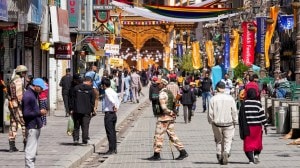Karat’s travels
CPI(M) General Secretary Prakash Karat shares his experience from his three-day trip to Greece from May 31 to June 2 on the invitation of the Communist Party of Greece

CPI(M) General Secretary Prakash Karat shares his experience from his three-day trip to Greece from May 31 to June 2 on the invitation of the Communist Party of Greece (KKE). He had one experience that could have a bearing on the Left’s approach to pension reforms in India.
The KKE had arranged for a visit to Larissa located about 280 km from Athens. The senior left leader was briefed about familiar problems faced by the working class there — “One of the problems faced by the workers is the theft of pension funds — an issue which will be of great concern to the working class in India where serious efforts are being made to privatise pension funds,” wrote Karat in the latest issue of the People’s Democracy.
UPA and working class
Evaluating the UPA’s performance in the last three years in terms of the interest of workers, CPI(M) politburo member and its trade union wing CITU president M.K. Pandhe dwells on the “violations” of the commitments made in the National Common Minimum Programme.
The National Rural Employment Guarantee Act was not effective. Pandhe wrote in People’s Democracy, “There has been actually increased unemployment… this sector had to face innumerable difficulties and witnessed many closures.”
While the NCMP rejected the idea of automatic hire and fire policy, “in practice, the UPA government is going in the opposite direction”, said the Left leader. “It is pushing the NDA’s proposal for a short-term employment whereby the employer gets a right to fire a worker… In short, the hire and fire policy is already being introduced through the back door.”
Referring to the recent electoral reverses suffered by the Congress in Punjab and Uttarakhand, Pandhe said, “The UPA government is getting isolated from the working class and the common people due to the non-implementation of the NCMP.”
Eye on health
In the third part of her series on health policy in People’s Democracy, CPI(M) politburo member Brinda Karat talks about the “vicious circle.” What is required today, she said, is a massive infusion of funds from the central government to re-energise the public heath system and create both physical and social infrastructure. In 1991, the public health expenditure to GDP was 1.3 per cent. This had come down to 0.9 per cent in 2001-02 and has increased only marginally since. According to her, “Another serious concern is the shortfall in the actual expenditure as compared to the outlay approved in the budget. The actual expenditure always falls short of the approved outlays.”
Compiled by D.K. Singh



- 01
- 02
- 03
- 04
- 05



























